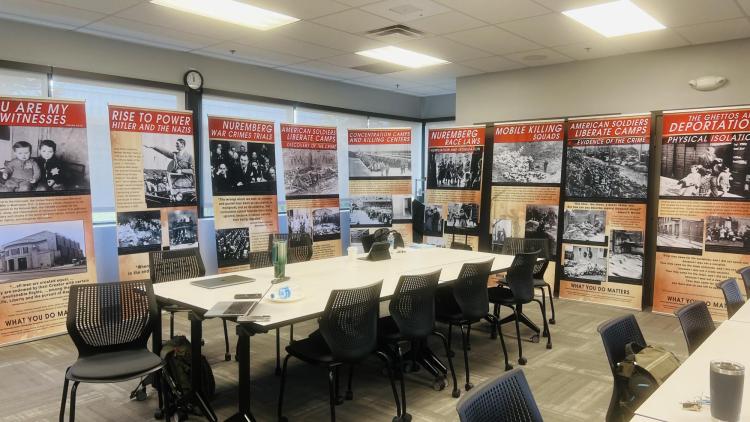
Stories from the Holocaust form the backdrop to discussions on ethics, bias and integrity in leadership.
In an eye-opening, interactive training, members of the University of Colorado Boulder police department, along with members of several regional police agencies, engaged in "What You Do Matters: Lessons from the Holocaust,” a course developed specifically for police in concert with the United States Holocaust Memorial Museum in Washington, D.C.
The class provided insight into how Germany transformed from a democratic society to one ruled by a totalitarian regime in less than a decade in the years leading to World War II. Visuals, audio clips and in-depth discussion are used to emphasize the importance of safeguarding against a culture shift of protecting individuals to supporting the abuse of human rights.
The course was co-taught by Arizona State University Police Chief Michael Thompson and retired Scottsdale (Arizona) Police lieutenant Todd Larson, EdD. Larson now serves as national director for the What You Do Matters Institute, traveling the country to teach the course primarily to a law enforcement audience.
“Those in policing and the criminal justice system interact with people all day, every day. Our course aims to get them to think about their impact in the community, especially as it pertains to trust," he said. “They have the authority to take away liberty, whether that be freedom or even life. The goal of our course is to emphasize how every interaction with every person matters, so they will think about how critically valuable these interactions are.”
Using posters depicting images and stories from the Holocaust, trained facilitators engage police officers and professional staff in dialogue about the role of police in today’s communities, and the importance of teaching and adhering to a mission of serving with integrity and humility, two of CUPD’s core values.
Residential Service Officer Kara Syvanen said that even though she’s a history buff, it was shocking to have the scale of the Holocaust presented with photos and recordings which emphasized the personal and social toll. “Bearing witness for the purpose of preserving the memory of what happened, partly so justice can eventually be found, is a lot like what officers do, albeit on a smaller scale,” she said.
CU Boulder Police Chief Doreen Jokerst said the training is particularly impactful against the backdrop of current events in the Middle East. “We are thankful for this thought leadership and excellent conversation during these challenging, heartbreaking times,” she said. “CUPD always adheres to a community policing philosophy and this training is a strong reminder of the importance of treating every individual fairly and with respect.”
Anyone in the campus community can watch a short video on the inspiration for the program, which is taught to law enforcement leaders, prosecutors and other criminal justice leaders throughout the nation.
The course, hosted by CUPD and offered to other local police departments, was paid for by a grant from the Colorado Department of Criminal Justice. It helps CUPD meet national accreditation standards by providing continuing education and training in the Duty to Intervene standard, while also supporting CUPD’s code of ethics.
